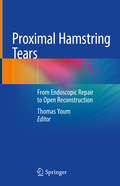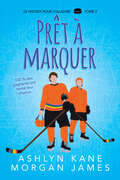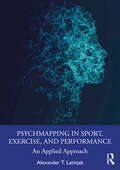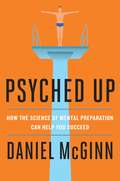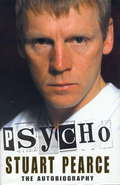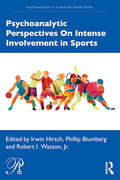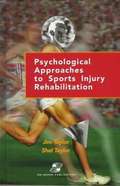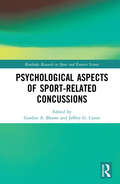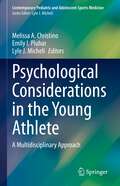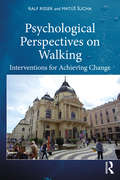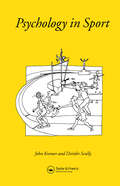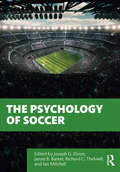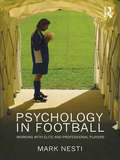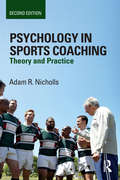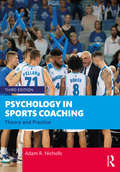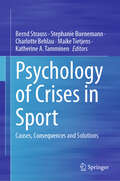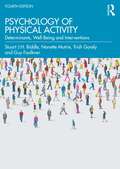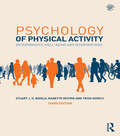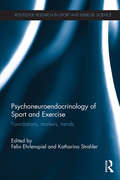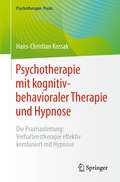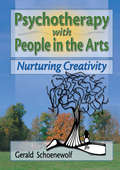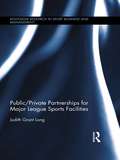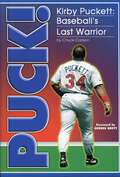- Table View
- List View
Proximal Hamstring Tears: From Endoscopic Repair to Open Reconstruction
by Thomas YoumCurrently, there are no texts focused on proximal hamstring pathology and surgical treatment options. While midsubstance muscle tears of the hamstring are typically treated non-operatively, proximal hamstring tears often require surgery, which can create anxiety for the orthopedic surgeon, as the exposure is deep and the sciatic nerve is at risk for injury. Moreover, the algorithm for repairing proximal hamstring tears is complex, as the spectrum of pathology starts from partial tears to acute tears to chronic tears with varying degrees of retraction. With the advent of arthroscopic procedures around the hip, innovative treatment methods such as endoscopic surgery have been utilized to repair the proximal hamstring. For successful treatment of chronic hamstring tendon tears, allograft reconstruction has been shown to be successful. The book opens with a thorough review of the relevant functional anatomy of the hamstring and related structures, before moving on to discuss epidemiology, classification and biomechanics of injury. The main focus, however, is on treatment strategies, from non-operative methods, including cutting-edge biologics, to open, endoscopic and arthroscopic approaches for partial, acute and chronic tears. The management of complications and rehabilitation protocols round out the presentation. Detailed illustrative case examples provide real-world demonstration of each chapter's concepts.Practical and user-friendly, Proximal Hamstring Tears will be very useful for the sports medicine, orthopedic surgery, rehabilitation medicine, and physical therapy communities.
Prêt à marquer (Le hockey pour toujours)
by Morgan James Ashlyn KaneDans sa nouvelle équipe de hockey désastreusement mal gérée, c&’est le chaos. Ryan Wright s&’attend à perdre des matchs, pas son cœur. La décontraction de Ryan devrait être un avantage à Indianapolis. Même s&’il marque peu sur la glace, il aide volontiers ses coéquipiers en difficulté. Et celui qui a le plus besoin d&’un ami, c&’est Nico Kirschbaum, censé être la superstar de l&’équipe. Méfiant de voir arriver dans l&’équipe un autre joueur gay, Nico comprend vite que la direction tente de le lui coller dans les bras. D&’accord, il a un problème, mais il compte le résoudre seul en travaillant avec acharnement, pas en faisant ami-ami avec le clown de service. Peu à peu, Ryan découvre en Nico un solitaire doué qui craque sous la pression. L&’entraînement ne suffira pas à colmater les brèches de sa psyché. Malheureusement, pour convaincre Nico d&’accepter son aide, Ryan doit se rapprocher de lui, jouer sur son sens de l&’humour et risquer son cœur. Nico et Ryan vont-ils tenter leur chance ou continueront-ils à gâcher les opportunités qui s&’ouvrent devant eux ?
PsychMapping in Sport, Exercise, and Performance: An Applied Approach
by Alexander T LatinjakUnderstanding why we act the way we do is key to fostering success. This book introduces PsychMapping, a unique model that visually and philosophically guides readers through the complexities of human behaviour. The holistic approach reveals how different psychological aspects interact and influence each other.The chapters follow the logic of the PsychMapping model, a map of all the key aspects in sport, exercise, and performance psychology. Each chapter is an opportunity for self-reflection and a perfect introduction for anyone interested in exploring the psychological aspects of human behaviour. Packed with practical experiences and real-world case studies, the book applies theories to life, making complex concepts accessible and actionable. A standout feature for professionals is the detailed self-reflection exercise, designed to enhance applied practice.PsychMapping in Sport, Exercise, and Performance is enriching for students, practitioners, and anyone eager to explore the psychological aspects of human behaviour.
Psyched Up: How the Science of Mental Preparation Can Help You Succeed
by Daniel McginnClosing the sale. Asking for a raise. Nailing the big presentation. Of the 2,000 hours you work every year, your success or failure is determined in the couple of dozen crucial hours when you need to bring your absolute best. Will you?The last few minutes before a major challenge can be terrifying. Ever wished you knew how to make sure you ace the make-or-break test, audition, or interview?We often feel the most powerless just before we’re expected to act powerful. As you’ll learn in this life-changing book, practice might make perfect, but perfection is useless if you can’t summon it when it counts. Pulling off a great speech or the pivotal at bat also requires the right kind of mental preparation.In Psyched Up, journalist Daniel McGinn dives into the latest psychological research and interviews athletes, soldiers, entertainers, and others who, despite years of practice and enviable track records, will ultimately be judged on their ability to delivera solid performance when it’s their turn to shine. For instance, he reveals...• How Jerry Seinfeld’s jacket and Stephen Colbert’s pen help them get laughs.• What General Stanley McChrystal said to Special Forces before they entered the battlefield.• Why the New England Patriots hired the DJ from the Red Sox to help them win.Among other counterintuitive insights, McGinn reveals why trying to calm your backstage jitters can be worse for your performance than channeling it into excitement; how meaningless rituals can do more to prepare you in the final moments than last-minute rehearsal; and how a prescription from your doctor could help you unleash your best skills.Whether you’re a sportsperson or a salesperson, an actor or an entrepreneur, one bad hour can throw away months of hard work. There’s so much conflicting popular advice that we often end up doing the wrong things. McGinn separates the facts from the old wives’ tales and shares new, research driven strategies for activating your talent, optimizing your emotions, and getting psyched up to take the spotlight.
Psyched! (Angel Park Soccer Stars #4)
by Dean HughesThe Angel Park players are so nervous about winning their upcoming "big game" with Blue Springs that they mess up all over the place.
Psycho: The Autobiography
by Stuart PearceIn an era of superstar prima donnas, Stuart Pearce's total commitment on the pitch earned him the affection of football fans everywhere, who nicknamed him Psycho. He will forever be remembered for two penalties - one missed and scored - for England, but there is so much more to him than that. This book reveals the fascinating story of one of football's greatest personalities. PSYCHO is as honest and straightforward as the man himself.
Psycho: The Autobiography
by Stuart PearceIn an era of superstar prima donnas, Stuart Pearce's total commitment on the pitch earned him the affection of football fans everywhere, who nicknamed him Psycho. He will forever be remembered for two penalties - one missed and scored - for England, but there is so much more to him than that. This book reveals the fascinating story of one of football's greatest personalities. PSYCHO is as honest and straightforward as the man himself.
Psychoanalytic Perspectives On Intense Involvement in Sports (Psychoanalysis in a New Key Book Series)
by Irwin HirschThis book is a unique volume that brings a variety of psychoanalytic perspectives to the study of sport. It highlights the importance of sports for different individuals and how the function and use of sports can be brought into the consulting room. Passionate interest in actively engaging in sports is a universal phenomenon. It is striking that this aspect of human life, prior to this volume, has received little attention in the literature of psychoanalysis. This edited volume is comprised largely of psychoanalysts who are themselves avidly involved with sports. It is suggested that intense involvement in sports prioritizes commitment and active engagement over passivity and that such involvement provides an emotionally tinged distraction from the various misfortunes of life. Indeed, the ups and downs in mood related to athletic victory or defeat often supplant, temporarily, matters in life that may be more personally urgent. Engaging in sports or rooting for teams provides a feeling of community and a sense of identification with like-minded others, even among those who are part of other communities and have sufficient communal identifications. This book offers a better psychoanalytic understanding of sports to help us discover more about ourselves, our patients and our culture, and will be of great interest to psychotherapists and psychoanalysts, or anyone with an interest in sport and its link to psychoanalysis and mental health.
Psychological Approaches to Sports Injury Rehabilitation
by Jim Taylor Shel TaylorIn dedicating this guide for rehabilitation specialists, consultants J. Taylor and S. Taylor (U. of Connecticut Health Center, Farmington) refer to frustration and patience as well as to pain and expertise, recognizing that bouncing back from sidelining sports injuries entails mind as well as body. Augmented by celebrity soundbites, the authors detail the referral process for assessing psychological problems; mental influences on rehabilitation (motivation, anxiety, focus); facilitatitive techniques (imagery, using negative thinking positively, pain management, social support); return to the sport; and development of a psychological rehab program (with sample forms, program prescription summaries). Annotation c. by Book News, Inc., Portland, Or.
Psychological Aspects of Sport-Related Concussions (Routledge Research in Sport and Exercise Science)
by Gordon A. Bloom Jeffrey G. CaronRecognition of concussion as a serious injury, informed by neurological and physiological research, is now commonplace in sport. However, research on the psychology of concussive injury—its psychological implications and outcomes, and psychological interventions for prevention and recovery—has largely been overlooked. This is the first book to explicitly and authoritatively set out the psychological aspects of sport-related concussion from a multidisciplinary and global perspective <P><P>The book attempts to offer a global understanding of the injury by presenting an historical overview; exploring the psychological implications of sport-related concussion and the influence of gender and sociocultural context on concussive injury and recovery; setting out practical guidance on working with special populations suffering from concussive injuries; and discussing the theoretical and methodological considerations for research on concussion and future directions for this research. <P><P>Written by a group of leading international experts and offering a hitherto underdeveloped perspective on this crucial area of sports injury research, this book is crucial reading for any upper-level student, researcher, sport scientist, coach, or allied health professional working on sport-related concussion. It is also valuable reading for students and researchers interested in the psychosocial processes that impact injury and recovery or general professional practice in sport psychology.
Psychological Considerations in the Young Athlete: A Multidisciplinary Approach (Contemporary Pediatric and Adolescent Sports Medicine)
by Lyle J. Micheli Melissa A. Christino Emily I. PluharThis book provides a broad and multidisciplinary review of psychological aspects of sport participation that are important to consider in young athletes. It discusses the many psychosocial benefits of sports, describes common mental health and body image issues pediatric athletes may suffer from, explains the psychological effects of injury and surgery on young athletes and the importance of mind-body connection, and advocates for safe sport participation and a multidisciplinary approach to the care of young athletes. This is the first text to discuss the psychological implications of sport participation in young athletes – a critical topic in today’s sport landscape that is often underappreciated and understudied. Bringing together contributions from prominent sports psychologists, sports medicine physicians and surgeons, coaches, and pain management specialists, Psychological Considerations in the Young Athlete combines the most up-to-date research, and serves as a valuable resource for clinicians, therapists, and athletic trainers who serve pediatric and adolescent athletes and sports teams.
Psychological Perspectives on Walking: Interventions for Achieving Change
by Ralf Risser Matúš ŠuchaPsychological Perspectives on Walking provides a comprehensive overview of the benefits of walking and shows how we can encourage people to walk more based on psychological principles. It examines how walking significantly improves health, positively impacts the environment, contributes to resolving social issues, and boosts the local micro-economy. This pioneering book discusses psychological motivations for walking versus not walking and asserts research-based arguments in favour of walking, including both theoretical considerations and everyday concerns. The book investigates the motivations that can lead to increased walking, advises on how to build walking-conducive habits, and recommends strategies for decision makers for promoting changes that will allow walking to thrive more easily. The authors include success stories and lessons learned from what have become known as 'walkable' cities to show how interventions and initiatives can succeed on a practical basis. This accessible, practical book is essential for urban planners; health specialists; policy makers; traffic experts; psychology, civil engineering, and social sciences students; and experts in the field of sustainable mobility. Psychological Perspectives on Walking will appeal to anyone in the general population in favour of a sustainable and healthy lifestyle.
Psychology In Sport (Contemporary Psychology Ser.)
by John M.D Kreme Deirdre ScullyPsychology in Sport aims to bring sport psychology closer to the heart of mainstream psychology. John Kremer and Deirdre Scully take a new and refreshing look at the most recent sport psychology literature, presenting this information in a way which will be immediately recognisable to students of psychology. Written in a clear and engrossing style, this new approach to Psychology in sport will be of immediate relevance to courses on introductory, applied and sport psychology, as well as providing a valuable reference source for general psychological material pertaining to sport and exercise.
Psychology in Elite Soccer: More Than Just a Game
by Joseph G. DixonSports psychology; exploring the effects of psychological interventions on important performance-related outcomes, has become ever more popular and prevalent within elite level soccer clubs in the past decade as teams look to gain psychological as well as physiological advantages over their competitors. Psychology in Elite Soccer; More Than Just a Game seeks to present ta detailed understanding of the theories underpinning the psychological issues relating to soccer along with practical insights into effective psychological interventions and strategies This book uses contemporary theory and research to elucidate key concepts and applied interventions and will include world-leading expert commentaries of contemporary theoretical and applied approaches in understanding critical issues in soccer along with providing practical implications and insights into working effectively in soccer-related contexts. Psychology in Elite Soccer; More Than Just a Game is an evidence-based resource to guide research and facilitate practice and will be a vital resource for researchers, practitioners and coaches within the area of sport psychology and related disciplines.
Psychology in Football: Working with Elite and Professional Players
by Mark NestiHow can the skills of the sport psychologist be put to best use within a football club? How can a sport psychologist help elite footballers perform at their maximum level? In this groundbreaking guide to the role of the sport psychologist within elite and professional football, leading sport psychologist Mark Nesti argues that working closely with coaches and players to create a receptive environment is vital if psychologists are to add maximum value to team and individual performances. Drawing on a decade’s professional experience working at the top level of English football, Nesti offers a detailed guide to delivering sport psychology in an elite team sport environment, from practical drills on the training field to shaping organizational behaviour at club level. The book explores the full range of issues and themes that define the role of the professional sport psychologist working in football today, including: mental skills training group cohesion and team dynamics counselling, trust and confidentiality transitions in football managerial and coaching philosophies structure, communication and organizational psychology. The book is illustrated throughout with real-world case studies, drawing on research into sixteen professional clubs across five European countries, and concludes by suggesting how other elite team sports can learn from the experiences of professional football. This is the only book to outline a holistic approach to psychology in football and the to offer such a rich combination of theory and practice. It is therefore essential reading for all students of sport psychology and all psychologists and coaches working in elite team sport.
Psychology in Sports Coaching: Theory and Practice
by Adam R. NichollsSome of the most effective coaches understand the fundamentals of sport psychology, which include interacting effectively with athletes, creating the optimal environment, assessing the psychological needs of their athletes, and even providing them with the mental training required to maximise performance. Fully revised and updated, the second edition of Psychology in Sports Coaching: Theory and Practice clearly and accessibly introduces the principles and practice of sport psychology in the context of the coaching process. Drawing on the very latest research and theory, the book introduces the psychological tools and techniques that coaches can use to get the best performances out of their athletes. Including six new chapters on applying self-determination principles in coaching, creating the optimal motivational climate, increasing motivation, developing anti-doping attitudes, promoting challenge states, and mindfulness-based stress reduction training, the book also offers step-by-step guidance on key topics such as: Assessing the needs of athletes Facilitating awareness through goal-setting and performance profiling Working with special populations, including children and injured athletes Building team cohesion Maximising relationships and socially supporting athletes Teaching mental skills such as imagery and coping Building mental toughness and confidence. Every chapter contains useful features to aid learning and understanding, including in-depth case studies, critical thinking questions, clear and concise summaries, and practice exam questions. Psychology in Sports Coaching: Theory and Practice is essential reading for any student of sports coaching or any practising coach looking to extend and develop their skills, and useful applied reading for students of sport psychology.
Psychology in Sports Coaching: Theory and Practice
by Adam R. NichollsThe most effective coaches understand the fundamentals of sport psychology, which include interacting effectively with athletes, creating the optimal environment, assessing the psychological needs of their athletes, and providing them with the mental training required to maximise performance. Fully revised and updated, the third edition of Psychology in Sports Coaching clearly and accessibly introduces the principles and practice of sport psychology in the context of the coaching process. Drawing on the very latest research and theory, the book introduces the psychological tools and techniques that coaches can use to get the best performances out of their athletes. Including three new chapters on the constraints approach to assessing psychological needs, mental imagery, managing perfectionism tendencies, and mentoring leaders, the book also offers step-by-step guidance on key topics such as: Assessing the needs of athletes Facilitating awareness through goal setting and performance profiling Coaching specialist populations effectively (e.g. children, adolescents, adults and athletes with learning disabilities) Reducing favourable attitudes towards doping Developing effective coach-athlete relationships Reducing choking under pressure Mindfulness techniques Mental imagery Every chapter contains useful features to aid learning and understanding, including in-depth case studies, critical thinking questions, clear and concise summaries, and practice exam questions. Psychology in Sports Coaching is essential reading for any student of sports coaching, or any practising coach looking to extend and develop their skills, and useful applied reading for students of sport psychology.
Psychology of Crises in Sport: Causes, Consequences and Solutions
by Bernd Strauss Stephanie Buenemann Charlotte Behlau Maike Tietjens Katherine A. TamminenThe book includes ideas and concepts from psychology in general, particularly sport psychology, and communication sciences, as well as applied sport psychology and case studies. In each chapter, the reader will first learn the theoretical and empirical background of concepts related to crises, and second, they will be introduced to how to apply this knowledge and methods to prevent and cope with crises. Throughout the book, well-known examples and case studies are addressed to gain a full understanding of crises.
Psychology of Physical Activity: Determinants, Well-Being and Interventions
by Stuart J. Biddle Nanette Mutrie Trish Gorely Guy FaulknerThe positive benefits of physical activity for physical and mental health are now widely acknowledged, yet levels of physical inactivity continue to be a major concern throughout the world. Understanding the psychology of physical activity has therefore become an important issue for scientists, health professionals and policy-makers alike as they address the challenge of behaviour change. Psychology of Physical Activity provides comprehensive and in-depth coverage of the fundamentals of exercise psychology, from mental health, to theories of motivation and adherence, and to the design of successful interventions for increasing participation. Now publishing in a fully revised, updated and expanded fourth edition, Psychology of Physical Activity is still the only textbook to offer a full survey of the evidence base for theory and practice in exercise psychology, and the only textbook that explains how to interpret the quality of the research evidence. As the field continues to grow rapidly, the new edition expands the behavioural science content of numerous important topics, including physical activity and cognitive functioning, automatic and affective frameworks for understanding physical activity involvement, new interventions designed to increase physical activity (including use of new technologies), and sedentary behaviour. A full companion website offers useful features to help students and lecturers get the most out of the book during their course, including multiple-choice revision questions, PowerPoint slides and a test bank of additional learning activities. Psychology of Physical Activity is the most authoritative, engaging and up-to-date book on exercise psychology currently available. It is essential reading for all students working in behavioural medicine, as well as the exercise and health sciences.
Psychology of Physical Activity: Determinants, Well-Being and Interventions
by Stuart J. Biddle Nanette Mutrie Trish GorelyThe positive benefits of physical activity for physical and mental health are now widely acknowledged, yet levels of physical inactivity continue to increase throughout the developed world. Understanding the psychology of physical activity has therefore become an important concern for scientists, health professionals and policy-makers alike. Psychology of Physical Activity is a comprehensive and in-depth introduction to the fundamentals of exercise psychology, from theories of motivation and adherence to the design of successful interventions for increasing participation. Now in a fully revised, updated and expanded third edition, Psychology of Physical Activity is still the only textbook to offer a full survey of the evidence-base for theory and practice in exercise psychology, and the only textbook that explains how to interpret the quality of the research evidence. With international cases, examples and data included throughout, the book also provides a thoroughly detailed examination of the relationship between physical activity and mental health. A full companion website offers useful features to help students and lecturers get the most out of the book during their course, including multiple-choice revision questions, PowerPoint slides and a test bank of additional learning activities. Psychology of Physical Activity is the most authoritative, engaging and up-to-date introduction to exercise psychology currently available. It is essential reading for all students working in exercise and health sciences.
Psychoneuroendocrinology of Sport and Exercise: Foundations, Markers, Trends (Routledge Research in Sport and Exercise Science)
by Felix Ehrlenspiel Katharina StrahlerPsychoneuroendocrinology is the study of the interaction between hormones, the brain and human behaviour. This is the first book to examine psychoneuroendocrinology in the context of sport and exercise, offering a comprehensive review of current research and assessment techniques and highlighting directions for future research. The book explores the links between hormones and behaviour, and draws important conclusions for how their study will aid in the understanding of the bidirectional link between sport and behaviour, central to the psychology of sport and exercise. It presents the key hormones that underpin behaviour in a sporting context, including the description of their physiologic mechanisms and behavioural effects. The book reports benchmark standards for the assessment and analysis of hormonal influences of behaviour in sport, and examines practical issues and contexts such as emotional state, overtraining and stress. Psychoneuroendocrinology in Sport and Exercise is a breakthrough text that will be of interest to all advanced students and researchers working in the psychology and physiology of sport and exercise.
Psychotherapie mit kognitiv-behavioraler Therapie und Hypnose: Die Praxisanleitung: Verhaltenstherapie effektiv kombiniert mit Hypnose (Psychotherapie: Praxis)
by Hans-Christian KossakDer Autor stellt als erfahrener Psychologischer Psychotherapeut die von ihm erprobte Therapiemethode vor, die als Kombination von moderner kognitiv-behavioraler Therapie und moderner Hypnose in der Psychotherapie, Medizin und Zahnmedizin bei zahlreichen Störungen, Erkrankungen und Problemstellungen sehr erfolgreich anzuwenden ist. Sie wirkt oft in wenigen Sitzungen und ist erwiesen sehr effektiv. Hier stellt der Autor sein Wissen und seine Erfahrung als Verhaltenstherapeut, Hypnosetherapeut und Gesprächspsychotherapeut zusammen. Entsprechend vermittelt er die Theorie und schwerpunktmäßig die praktischen Anwendungen mit zahlreichen Fallbeispielen klar und schnell nachvollziehbar. Geschrieben für: Anfänger und Praktiker im Bereich der kognitiv-behavioralen Therapie als auch in der klinischen Hypnose können zahlreiche Impulse für ihre Arbeit erhalten. Auch Studierende aus diesen klinischen Berufsbereichen erhalten Einblicke und wertvolle anschauliche Anregungen und Vorbilder zur Diagnostik, Therapieplanung und Therapiedurchführung dieser Methode.Über den Autor:Dr. Dipl.-Psych. Hans-Christian Kossak verfügt über 50 Jahre Berufserfahrung als Psychologischer Psychotherapeut (Verhaltenstherapeut, Gesprächspsychotherapeut, Hypnosetherapeut) und Dozent auf nationalen und internationalen Fachkongressen und in Fortbildungsseminaren. Er ist bekannt für seine praxisnahen Darstellungen und besonders für seine umfangreichen Erfahrungen, die er sehr plastisch vermitteln kann.
Psychotherapy with People in the Arts: Nurturing Creativity
by Terry S Trepper Gerald SchoenewolfLearn to free creativity from the shackles of emotional conflicts!This riveting collection of case histories illustrates the dark interplay of neurosis and creativity. Psychotherapy with People in the Arts explores the struggles of writers, painters, actors, and composers to reconcile their overwhelming need to create and the self-doubts, frustrations, and neuroses that block their potential. In addition to ten inspiring tales of healing and self-knowledge, Psychotherapy with People in the Arts provides a solid introduction to the primary issues related to emotional disorders and creativity. It begins with a study of the notoriously reclusive and eccentric writer J. D. Salinger. Using both theory and case example, it shows how family history, present relations, and genetics can combine to impede the flow of an artist&’s natural gifts-and how a good therapist can help unblock that creative power. It also includes a series of tests to diagnose blocked creativity. Psychotherapy with People in the Arts explores such compelling themes as: dealing with racism and internalized self-hatred the conflict between commercial and high art anger and blocked tears the drive for an impossible perfection emotional alienation and sexual acting outPsychotherapy with People in the Arts is a fascinating look at a complex and controversial subject. Though not everyone is a professional artist, every human being has creative potential that can be blocked by emotional disturbances. And every therapist, mental health educator, and artist will find rich sources of information and inspiration in this book. Visit the author's website at http://www.livingcenter.net
Public-Private Partnerships for Major League Sports Facilities (Routledge Research in Sport Business and Management)
by Judith Grant LongThis volume takes readers inside the high-stakes game of public-private partnerships for major league sports facilities, explaining why some cities made better deals than others, assessing the best practices and common pitfalls in deal structuring and facility leases, as well as highlighting important differences across markets, leagues, facility types, public actors, subsidy delivery mechanisms, and urban development aspirations. It concludes with speculations about the next round of facility replacement amidst rapid changes in broadcast technology, shrinking domestic audiences, and the globalization of sport.
Puck Kirby Puckett
by Chuck CarlsonThis is the story of Kirby Puckett and his remarkable journey from the projects of the south.
